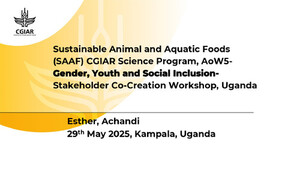
Studying a gender responsive vaccine system: Retrospective analysis of best methods
Abstract
This methodological paper introduces four projects, all of which aimed to increase women’s engagement in and benefit from the livestock vaccine value chains of small ruminants and poultry by improving women’s empowerment and supporting women’s access to animal health services. All four projects used a mix of qualitative and quantitative research methods to understand the livestock vaccine system. Despite these shared aims, selected value chains, and research methods, the projects took different approaches to understanding the technical barriers for women’s engagement and benefit, women’s empowerment in the areas where they work, the policy landscape and implications, and gender norms of the societies where they work. The goal of this paper is to introduce the four projects, describe each project’s distinct research approach, and compare across projects how various qualitative and quantitative research methods contributed to understanding four elements which we identified as necessary for a fully functioning, gender responsive vaccine system: technical aspects (acumen/flow/effectiveness), women’s empowerment, policy environment, and gender norms.
Citation
McKune, S., Galiè, A., Miller, B.A., Bukachi, S.A., Bikaako, W. and Pyburn, R. 2023. Studying a gender responsive vaccine system: Retrospective analysis of best methods. Frontiers in Sustainable Food Systems 7.









